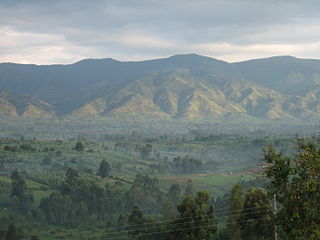
North Kivu is a province bordering Lake Kivu in the eastern Democratic Republic of the Congo. Its capital is Goma. The 2020 population was estimated to be 8,147,400.

Goma is the capital and largest city of the North Kivu Province in the eastern region of the Democratic Republic of the Congo (DRC). It is located on the northern shore of Lake Kivu,next to the Rwandan city of Gisenyi. It shares its borders with Bukumu Chiefdom to the north,Rwanda to the east,Masisi Territory to the west,and is flanked by Lake Kivu to the south. The city lies in the Albertine Rift,the western branch of the East African Rift System,and is only 13–18 km (8–11 mi) south of the active Nyiragongo Volcano. With an approximate area of 75.72 square kilometers,the city has an estimated population of nearly 2 million people according to the 2022 census,while the 1984 estimate placed the number at 80,000.
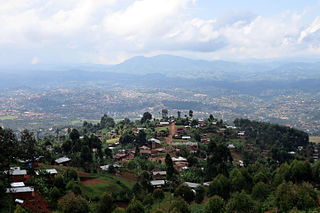
Butembo is a city in North Kivu,in the north eastern Democratic Republic of Congo,on the Rwenzori graben and west of Virunga National Park. The city is an important commercial centre with large markets,a cathedral,multiple large hospitals,and an airport. It is the city where live the most prosperous businessmen of the East of the country. The city is located in a region known for tea and coffee growing. As of 2024 it had an estimated population of 154,621.

Eugène Serufuli Ngayabaseka is a Congolese politician,the ex 2nd Vice President of the Congolese Rally for Democracy-Goma and was the governor of Nord-Kivu province from July 31,2000 until 2007,when was succeeded by the RCD-K-ML candidate,Paluku Kahongya Julien.

Masisi Territory is a territory which is located within the North Kivu Province of the Democratic Republic of the Congo. Its political headquarters are located in the town of Masisi.
The Congolese Rally for Democracy,also known as the Rally for Congolese Democracy,is a political party and a former rebel group that operated in the eastern region of the Democratic Republic of the Congo (DRC). It was supported by the government of Rwanda,and was a major armed faction in the Second Congo War (1998-2003). It became a social liberal political party in 2003.
Kanyabayonga is a town straddling the Lubero and Rutshuru territories of North Kivu province in eastern Democratic Republic of the Congo (DRC). Administratively,the part which is in Lubero is the commune of Kanyabayonga and,the part in Rutshuru belongs to the Kanyabayonga groupement (grouping) which extends well south of the town and is within the Bwito chiefdom. The region as a whole has seen much armed conflict since 1993.
The Congolese Rally for Democracy–Goma was a faction of the Congolese Rally for Democracy,a rebel movement based in Goma,Democratic Republic of the Congo (DRC) during the Second Congo War (1998–2003). After the war,some members of the group continued sporadic fighting in North Kivu. The movement also entered mainstream politics,participating in democratic elections with little success.

Rutshuru Territory is a territory in the North Kivu province of the eastern Democratic Republic of the Congo (DRC),with headquarters is the town of Rutshuru.

Lubero is a town in the North Kivu Province of the Democratic Republic of the Congo. It is the administrative center of the Lubero Territory. Following the surrender of the Mai-Mai fighters in 2021,construction of a new market began in 2022,involving the mayor,ex-soldiers,"young people at risk and the vulnerable women". As of March 2014,the population of Lubero is not publicly known.
The following is a timeline of the history of the city of Goma,Democratic Republic of the Congo.
Mai-Mai Kyandenga is a Mai-Mai armed group operating in north-eastern Democratic Republic of the Congo. It claims to protect the local population of Beni Territory and their land. It still remains unclear what the actual goal of the group is and how much it has in connection with the Union of Patriots for the Liberation of Congo (ULPC),Allied Democratic Forces (ADF),and other Mai-Mai groups operating in the area.
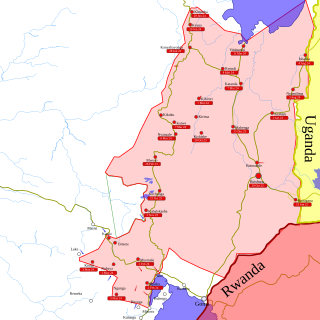
In late March 2022,the March 23 Movement (M23),supported by Rwanda,launched an offensive in North Kivu against the Armed Forces of the Democratic Republic of the Congo (FARDC) and MONUSCO. The fighting displaced hundreds of thousands of civilians and caused renewed tensions between the Democratic Republic of the Congo and Rwanda.
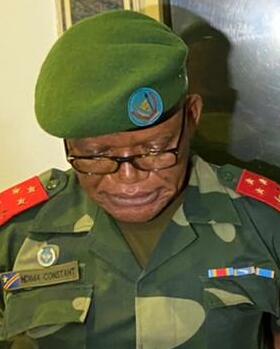
Constant Ndima Kongba is a Congolese military officer who has served as the military governor of North Kivu since May 2021. Before this appointment,he had served in high-ranking positions in the Armed Forces of the Democratic Republic of the Congo (FARDC). In the Second Congo War (1998–2003),Ndima was a commander in the Movement for the Liberation of the Congo;in this role,he was involved in Operation Effacer le tableau,a campaign that resulted in genocidal massacres.

In late July 2022,anti-MONUSCO protests manifested in the Democratic Republic of the Congo. The protests were against MONUSCO,the United Nations' peacekeeping force in the country,which has been accused by Congolese politicians and civilians of failing to take action to end the decades-old conflict within the country. The protestors demanded that MONUSCO leave the country.
Kinyandonyi is a village in the Rutshuru Territory of the North Kivu Province,Democratic Republic of the Congo. Kinyandonyi is situated 10 km east of the city of Kiwanja in Bukoma groupement,in the Bwisha Chiefdom and 85 km north of the capital of the province Goma. The region is inhabited by the Hunde people as well as some remaining autochthonous populations of African Pygmies,including the Twa people and the Mbuti people. In addition to the Hunde,Twa,and Mbuti,there are other ethnic groups,including the Nyanga,Lega,Kumu,Hutu and Tutsi.

Kitchanga,also known as Kitshanga,is a town and a camp for Congolese Internally Displaced People (IDPs) strategically positioned between Masisi and Rutshuru territories of the North Kivu Province,with a vantage point overlooking Lake Kivu in the eastern region of the Democratic Republic of the Congo (DRC). Administratively,the Masisi part of Kitchanga functions as a larger urban center and the capital of the Bashali Chiefdom,while the other part is situated in the Bwito Chiefdom of the Rutshuru Territory. Geographically,Kitchanga is located approximately 90 km northwest of Goma and 10 kilometers north of Burungu,in close proximity to the villages of Kizimba and Budey. As of 2015,the population of Kitchanga was estimated at 18,927 for the Masisi Territory part and 25,157 for the Rutshuru Territory,excluding the populace within the displaced sites of Kahe and Mungote adjacent to Kitchanga in the Masisi Territory.
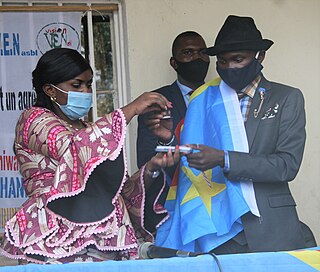
The Bwito Chiefdom is a chiefdom located in the Rutshuru Territory of North Kivu Province in the Democratic Republic of the Congo (DRC). It is bordered to the north by Batangi Chiefdom and Kanyabayonga commune in Lubero Territory,Bwisha Chiefdom in the east,and to the north-east by Lake Edward and the Republic of Uganda. To the west,it is bordered by Bashali Chiefdom in Masisi Territory,and to the northwest by Wanyanga Chiefdom in Walikale Territory. To the south,it is bordered by Nyiragongo Territory.

The Bashali Chiefdom is a chiefdom located in the Masisi Territory of North Kivu Province in the eastern region of the Democratic Republic of the Congo (DRC). Topographically,it is bounded to the east by the Virunga National Park,to the north by the Bwito Chiefdom of Rutshuru Territory,to the northwest by Walikale Territory,to the south by the Bahunde Chiefdom,and to the west by the Osso sector. Encompassing a total area of 1,582 square kilometers,the chiefdom is the administrative and sociopolitical structure for the Hunde ethnic group and is administratively subdivided into two groupements:Bashali-Mokoto and Bashali-Kaembe. Kitchanga,the urban center and administrative capital of the Bashali-Mokoto groupement,is the most densely populated locality within the chiefdom.
Muhingo Nzangi Butondo is a Congolese politician who is currently serving as the Congolese Minister of Rural Development since May 2024 and as a member of the National Assembly for Goma since 2024. He had previously served as the Minister of Higher Education from 2021 to 2024,and as deputy for Butembo from 2012 to 2024.













